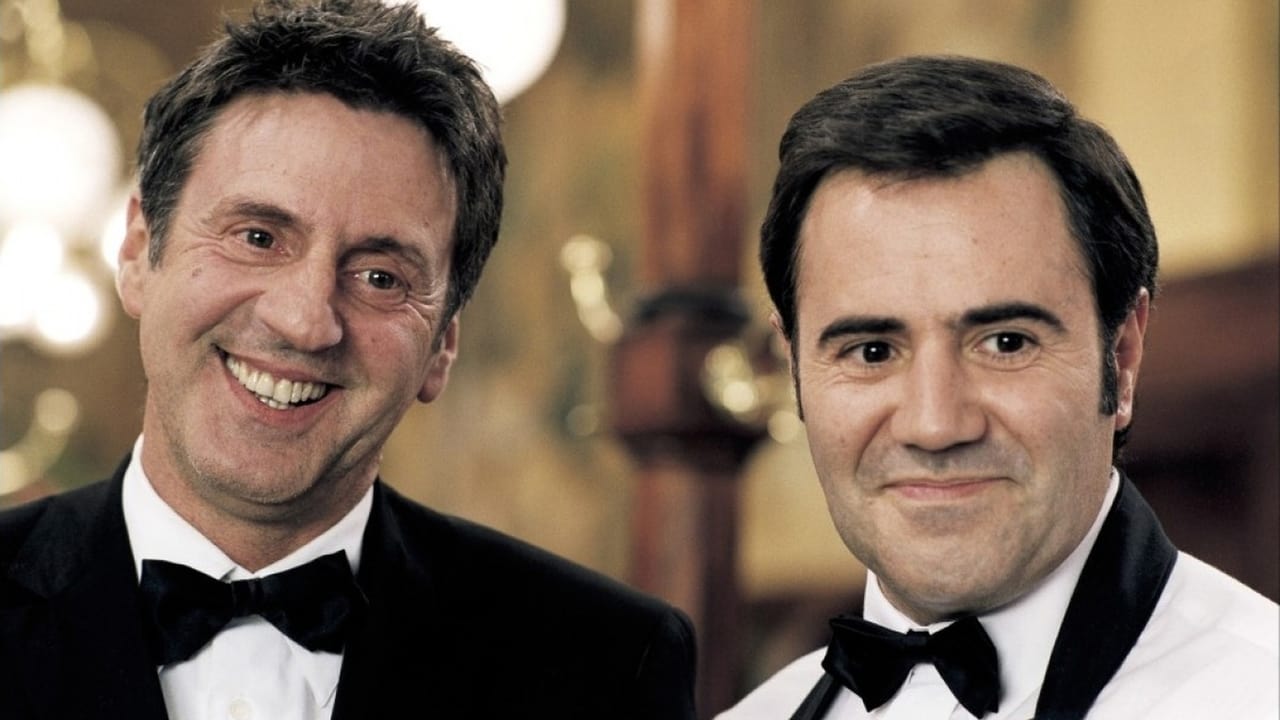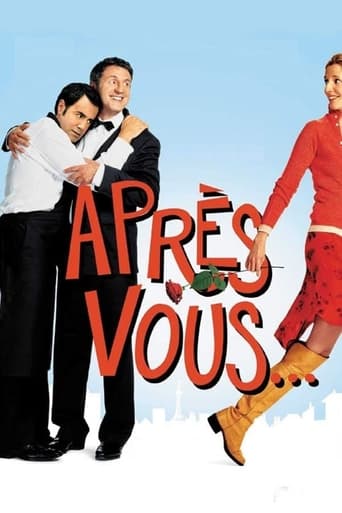

This really is a bundle of laughs, and they never stop from beginning to end. Daniel Auteuil, better known for serious roles, here shows himself as a superb comedian with good timing and just the right touch. Pierre Salvadori is the director, and after making this film he went on to direct Audrey Tautou, the Elf, twice, in PRICELESS (2006, see my review), and BEAUTIFUL LIES (2010, see my review). I noticed that this film was dedicated to the late Marie Trintignant, who died tragically in this year at the age of only 41. Salvadori had directed her in WHITE LIES (1998) and it is very touching that he remembered her with a tribute. The female lead in this film is the omni-present Sandrine Kiberlain, who seems to be in everything. As she so often does, she plays a slightly pathetic woman (in this case she is a young widow) who nevertheless sets various hearts on fire. The main story is carried to its full comic potential in a most amazing way. Auteuil is hastening through a park one dark night because he is late to work. He is the head waiter at a small brasserie called Chez Jean. (Although the name is fictitious, the film is shot in a real Paris restaurant, though I do not recognise it and cannot say where it is, unfortunately. It is not as small as Brasserie Balzar, one of my favourites, but small brasseries are really very rare nowadays in Paris, and I wish I could find this one.) He comes across a man about to hang himself from the branch of a tree. He rushes up and saves him. There is an old proverb that if you save a man's life, you then become responsible for him. Well, this film carries that thought to the most extreme extent possible. The man is played by José Garcia. He does a wonderful job and the character he creates is so exasperating, and also so comical, that it adds to the hilarity of the film immensely. Having saved Garcia, Auteuil is now stuck with him. Garcia has no money, no place to live, no job, and no prospects. So Auteuil takes him in and stands guard to stop him trying suicide again. He then gets him work in his own brasserie and commences a hilarious search for the girl who broke his heart by leaving him, who turns out to be Kiberlain, who runs a florist shop. The entanglements and complexities of the story, and their comical results, become increasingly astounding and it is impossible to stop laughing. Salvadori and four other people collaborated on the brilliant script, and the result has all the polish of a much-rewritten and perfected comedy masterpiece. The film has an unexpected ending, but with such a story, the unexpected is expected. Hats off to all concerned!
... View MoreAntoine (Daniel Auteuil) is a head waiter in a chic Parisian restaurant and lives with his girlfriend Christine (Marilyne Canto). His work occupies a lot of place in his life. One evening, by going through a park to be more quickly at his apartment, he saves from suicide a neurotic man Louis (José Garcia). After vainly attempted to take him back to his close relatives, he takes him under his wing and succeeds to find him a job as a waiter in his workplace. Louis wanted to kill himself because his love affair with his ex girlfriend Blanche (Sandrine Kiberlain) went unravel. Antoine found her again because he wants to reconcile them again. She's a charming florist and, you guess it he becomes enamored of her. From then onwards, his well-ordered life starts to showcase signs of poor running.I'm a little surprised but glad to discover that this little high charged, hilarious comedy enjoys a small reputation abroad. About twenty reviews have already been posted for this film and most of them gave the movie thumbs up. I will post another positive one in spite of minor flaws Pierre Salvadori's film showcases.Some will be probably surprised but the outset reminded me of Jean Renoir's classic "Boudu Sauvé Des Eaux" (1932), perhaps because of the quite prestigious situation the main protagonists of the films occupy and maybe also because they save from suicide ill-fated men who are cracking up. And then, the saved ones immerse themselves in their rescuers' lives and disrupt their living environment. But although both movies are comedies, they don't belong to the same sub-category. Pierre Salvadori preferred not to follow the steps of the master which bestowed his own work with a strong social satire whiff. There's no trace of it in "Après Vous", although there may be an inkling of it in the following sequence: when Antoine takes Louis in the cellar and shows him the names of the different wines. Louis is afraid not to recognize the right wines and I think that Antoine answers him the customers ape the connoisseurs and don't know anything about wines. The director preferred to choose the road of the sentimental comedy and to especially focus on Antoine's turbulent love life.Pierre Salvadori commands his film at arm's length and delays the most momentous moment of the movie (the meeting between Louis and Blanche) to better linger on Louis' new life and especially on Antoine's love trouble. In a way, by making Louis work in his restaurant, by undertaking to reconcile him with Blanche and unfortunately by having a crush on her, he is a victim of his generosity. And Louis doesn't really realize the situations in which he puts Antoine. There's a funny sequence around the beginning of the film during which Antoine is at Louis' grandmother's and tries to alter Louis' suicide note in a placating, comforting letter. Then, deep down inside him, he thinks of leaving his ex girlfriend to live with Blanche and has to lie to his protégé and circle not to arouse suspicion about his real motivations. The movie becomes very enjoyable when it accumulates misunderstandings and embarrassing situations linked with Louis' job as a waiter or Antoine's sentimental trouble which the latter tries to escape by hilarious means (check the sequences in the Chinese restaurant). The scenario is also interspersed with droll lines: "how do you find the chicken? Dead".A threesome of actors serves the film. Daniel Auteuil is able to provide enough caliber to his character to watch the film until the tail end and I would like to congratulate the user "writer's reign" for the tasty pun he inserted in his review: "maitre d'Auteuil". José Garcia who earlier showed in his career that he could hold comical as well as dramatic roles (Philippe Harel's "Extension Du Domaine De la Lutte, 1999) shines as the neurotic, wound up Louis, indirectly responsible of Antoine's mishaps. At last, Sandrine Kiberlain, a little frail, naive but the director never ridicules her. She was ideally cast as Blanche. In French, this name is also an adjective which means white and the actress has a somewhat pallid face which suits well to both the name and the personality of her character.If the director honed his work with a palpable painstaking care for much of his work, there are little setbacks towards the end of the road. The end is thoroughly unexpected but was made in a rush and the trick of the lighter has been seen many times before. But these flaws aren't major enough to reject Salvadori's film. So, "Après Vous" and enjoy your film!
... View MoreFrench farce is an acquired taste, especially since a lot of the sensibilities that drive the plots of such confections are uniquely Gallic in nature. Directed by Pierre Salvadori, this 2005 movie, a spirited throwback to an earlier time in French cinema, is no exception, as it plays like a shaggy-dog, transatlantic re-take on Frank Oz's "What About Bob?" with unsettling traces of Adrian Lyne's "Fatal Attraction" thrown in for good measure. For those who don't embrace this type of farce easily, the film's central flaw is its strenuous premise - that a Good Samaritan who saves a man from suicide has an obligation to ensure that person no longer has a reason to end his life, no matter what it takes.Credited to four writers (not a good sign), the paper-thin plot focuses on Antoine, a dedicated restaurant maître d', who literally stumbles upon the hapless Louis, who is about to hang himself in the throes of a failed relationship. Antoine saves the near-catatonic Louis and starts to mend his life, first by retrieving a suicide note from Louis's grandparents, putting Louis up in his apartment much to the chagrin of Antoine's sensible girlfriend Christine, and then trying to reunite Louis with his object of obsession, Blanche. The rest is pretty predictable, though there are some nice slapstick scenes interspersed here and there, for instance, the interview and the lobster with the curling tail. By the way, the food at the fictitious Chez Jean restaurant looks wonderful, thanks to Gilles Henry's rich cinematography.Daniel Auteuil, France's favorite actor, is the one saving grace of the film as he plays Antoine with some sense of comedy skill and befuddled vulnerability, although his character becomes increasingly disconnected with rational behavior as the movie lurches along. As Louis, José Garcia plays an impossible role as well as can possibly be expected, but the character's intolerable nature finally gets the best of him. As Blanche, the woman in between, Sandrine Kiberlain is wan and sallow, hardly a presence that would elicit such adoring behavior. Better is Marilyne Canto, who as Christine, is the only one who seems to represent a reasonable viewer perspective. It all ends predictably though hardly satisfactorily. The movie is intermittently amusing, oddly fitful for the most part, but more pervasively frustrating for the unfortunate premise by which it all hangs so precariously. The DVD has no significant extras.
... View MoreThe film runs almost two hours, which is one hour too many. Daniel Auteuil (Antoine) somehow saves (but what is to be saved?) the day, because he is a good actor, and it's always a pleasure to see him on the screen. But what is he doing in such a film? Maybe he was short of money to pay the mortgage? The film starts well, showing interesting possibilities in the hand of a good director, but especially a good scenarist. However, it soon looses its way, becomes repetitive, and after about one hour, one wishes Jose Garcia (Louis) had succeeded in hanging himself, at the beginning of the film: it would have been an act of mercy for Louis and for the audience. The laughs are few and far in between. The only situation of any comical value is Andre's visit to Louis' grand mother. And let's not forget the only funny exchange in the film: Antoine:"How's the chicken?" Louis: "Dead." And that's as good as it gets...
... View More